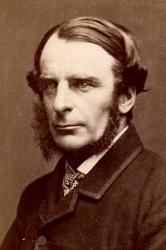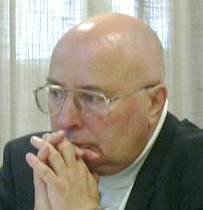Planning worship?
Check out our sister site, ZeteoSearch.org,
for 20+ additional resources related to your search.
- |
User Links
Person Results
Charles Kingsley

1819 - 1875 Person Name: Charles Kingsley, 1819-1875 Author of "From You All Skill And Science Flow" in The Hymn Book of the Anglican Church of Canada and the United Church of Canada Kingsley, Charles, M.A., son of Charles Kingsley, of Battramsley, in the New Forest, was born June 12. 1819. at Home Vicarage, Devon. In 1838 he entered Magdalene Coll. Cambridge, and graduated as first class in classics, and senior optime. Subsequently Rector of Eversley 1814-1875; Canon of Chester 1869-1873; and Canon of Westminster 1873-1875. He held also other important appointments. He died at Eversley, Jan. 23, 1875. Canon Kingsley's prose works are too well known to be enumerated here, and his poetical productions have little in common with hymnology. Three of his pieces have come into use as hymns:—
1. Accept this building, gracious Lord. [Hospitals.] "Mrs. Kingsley's account of this hymn is:—
"On the 4th of December [1871], Lord Leigh laid the foundation stone of the working men's block of the Queen's Hospital at Birmingham with masonic honours, and the following simple hymn, which Mr. Kingsley had been requested to compose for the occasion, was sung by a choir of 1,000 voices:—
'Accept this building, gracious Lord,
No temple though it be;
We raise it for our suffering kin,
And so, good Lord, to Thee.'"
The hymn in full follows in 6 stanzas of 4 lines. (Charles Kingsley: His Letters and Memoirs of his Life. 1876, vol. ii., p. 370.) From this the hymn, well-known in American collections and in a few in Great Britain, “From Thee all skill and science flow," is taken. It is composed of stanzas iii.-vi.
2. My fairest child, I have no song to give you. [Purity and Courage.] Appeared in his Andromeda and Other Poems, 1858, p. 64, in 2 stanzas of 4 lines and entitled "Farewell." In the Life and Works of Kingsley, Poems, vol. 16, 1902, it is given in 3 stanzas of 4 lines, and inscribed to "C. E. G." and the appended date is "February 1, 1856." The addition of the extra stanza, as given in Mrs. Kingsley's Charles Kingsley: His Letters, &c,
1876, vol. ii., p. 236, is thus explained: "The Farewell' to his niece Mrs. Theodore Waldron, then Charlotte Grenfell, was written this year [1856], and as the second verse, by some mistake, was not published, it is given entire here." At the end of the poem the place and date are given as "Ray” Lodge, 1856." The lines so frequently included in hymnals for Girls' High Schools, "Be good, sweet maid, and let who will be clever," are from this poem.
3. Who will say the world is dying [The Coming Kingdom.] In his Andromeda and Other Poems, 1858, p. 123, in 3 stanzas of 8 lines and entitled "The World's Age." is dated 1849. In Horder's Worship Song, 1905.
--John Julian, Dictionary of Hymnology, New Supplement (1907)
Charles Kingsley
Albrecht Kronenberger

b. 1940 Translator of "Kanto, ekzemple:" in Adoru Albrecht Kronenberger, born January 21, 1940, in Würzburg, Germany, was one of the three editors of ADORU - Ekumena Diserva Libro. As a youth, lived in Pirmasens and Germersheim; studied philosophy and Catholic theology in Eichstätt (Bavaria), Frankfurt (Hesse), and Speyer, where he was ordained a priest in 1966. After serving as vicar in Frankenthal and Bellheim, he worked from 1969 to 2002 as a Gymnasium (secondary school) teacher of religion in Neustadt an der Weinstraße, where he has remained in his retirement.
Not long after learning Esperanto in the late 1980s, he began to be active in teaching Esperanto in his school and in celebrating Esperanto-language masses in connection with Esperanto conventions and in the cathedral of Speyer (every other month since 1991). In 1991 he also cofounded the Working Union of IKUE in the Speyer diocese, which was officially acknowledged and approved by the bishop.
Albrecht Kronenberger edited the 1,472-page ADORU together with Adolf Burkhardt and Bernhard Eichkorn. He typeset all its texts and music on his computer, as well as writing many texts and some melodies himself. The three editors were awarded the FAME Prize (a cultural prize of the city of Aalen and of the FAME Foundation) in 2002.
In the first few years of the third millennium, Kronenberger edited the new edition of the Esperanto Bible, which appeared in 2006. Beginning in 2007, he put all of the hymns of the Latin Breviary, many of them his own translations, into Vikifonto (the Esperanto version of WikiSource). He initiated and arranged "Kantoj post ADORU", a hymnal supplement published as a special issue (No. 1-3/2009) of Espero Katolika. Since 2009, in collaboration with Marius Gibbels, he has been working on a project (Projekt Deutsch-Esperanto) that aims to produce a truly complete online German-Esperanto dictionary.
The German-language church songbook "Gotteslob" contains one of Albrecht Kronenberger's compositions, a Gloria (#455).
(main source: Esperanto Wikipedia)
Albrecht Kronenberger
Jochen Klepper
1903 - 1942 Author of "Kanto, ekzemple:" in Adoru b. Joachim (Jochen) [Klepper] on Mar. 22, 1903, d. Dec. 10/11, 1942; literary author
Jochen Klepper
Fritz Werner
1898 - 1977 Person Name: Fritz Werner, 1898- Composer (melody) of "DER TAG" in The Hymn Book of the Anglican Church of Canada and the United Church of Canada Werner, Fritz; b. 1898, Berlin; conductor, organist
Fritz Werner


 My Starred Hymns
My Starred Hymns


